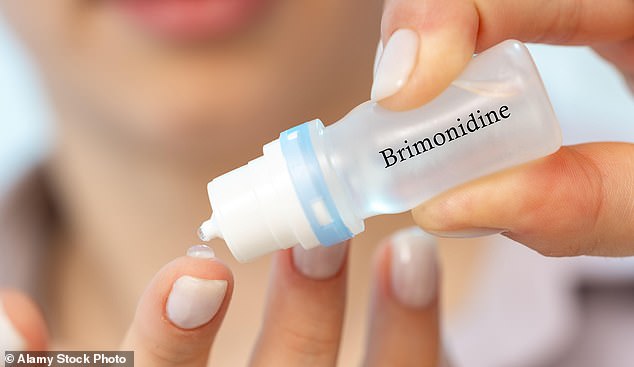DR. MARTIN SCURR: The drugs that can really soothe blotchy skin and how your mood can make it worse
I suffer from severe rosacea, which has gotten worse since it started about two years ago. Rozex has had a limited effect.
The symptoms come and go in severity, but lately I have also been getting very large spots in combination with smaller bumps and pimples.
I’m probably paranoid, but I don’t want to meet people who know what I used to look like.
CH, by email.
Rosacea is an inflammatory condition that causes flushing and redness in the face, pimples and irritation around the eyes
Dr. Martin Scurr replies: Thank you for your question, which highlights the too often ignored but profound psychological effect that a chronic facial rash can have.
Rosacea is an inflammatory condition that causes facial flushing and redness, pimples and irritation around the eyes. It can also thicken and distort the skin, usually around the nose. The cause is not clear.
As you know, there are times when symptoms flare up: these include extreme temperatures, sun exposure, spicy foods and hot drinks.
Anger, frustration, shame and other mood swings can also worsen the appearance of the skin – possibly involving changes in the nervous system (the adrenaline rush and so on, increases in blood pressure, heart rate and ‘flushing’) – causing the rosacea to appear. ). Fortunately, symptoms can be controlled with treatment.
Rozex, which you are using, is a topical gel that contains the antibiotic metronidazole.

A recent and remarkably effective addition to the arsenal is a topical gel containing brimonidine
There are other effective topical treatments including azelaic acid, ivermectin and sodium sulfacetamide (all available by prescription only). Oral antibiotics can also be remarkably effective; I normally prescribe oxytetracycline or doxycycline.
A recent and remarkably effective addition to the arsenal is a topical gel containing brimonidine.
This was originally developed in the form of eye drops to treat glaucoma, but then patients who also had rosacea reported that the overflowing eye drops running down their cheeks cleared up the redness of their face.
This benefit has since been confirmed in studies and a 0.33 percent brimonidine gel is now available by prescription. Combining this gel with an oral antibiotic may be the best option for you as it helps free you from the concerns about your appearance that have come to dominate your life.
I have a strange noise in my left ear and after an MRI my doctor told me I have an acoustic neuroma. I am now waiting to see a specialist, but as I have been told this is not urgent it may be a long wait. I am a musician and am afraid that in the meantime it will grow and cause deafness. I am 60 and very fit.
AR, London.
Dr. Martin Scurr replies: There are few things more frightening than being told you have a brain tumor, and for you, as a musician, the fear is compounded by the threat of progressive hearing loss.
The sound you may hear is tinnitus, caused by an acoustic neuroma, a growth on the nerve responsible for carrying hearing and balance information from your inner ear to your brain.
But I can reassure you: ‘tumor’ does not necessarily mean cancer; it is a lump, which in the case of an acoustic neuroma is benign.
These tumors typically grow very slowly and are not inherently life-threatening.
They usually occur around age 50 and 95 percent of patients have hearing loss, although the first sign is usually tinnitus or dizziness.
If an acoustic neuroma is large, it can affect other nearby nerves, mainly the trigeminal nerve (which runs down the front of the face), which can cause numbness or pain in the face; or the facial nerve (which runs from the ear to the front of the face), which affects facial movement or the sense of taste.
Preserving your hearing is of paramount importance, but since all treatment options can lead to further deterioration of your hearing, it is worth proceeding with caution.
Radiation therapy can shrink the tumor somewhat, although its effectiveness in preserving hearing is variable. In many cases the tumor can be surgically removed, but this usually does not lead to an improvement in hearing.
Another option is ‘watchful waiting’, where your tumor is regularly monitored with further MRI scans (around 50 percent of patients who choose watchful waiting will undergo treatment within five years).
I suggest you ask your GP for a repeat MRI and hearing test six months after your first scan. This gives the specialist additional information about how fast your tumor is growing and whether your hearing is deteriorating, so that he or she can make decisions about your treatment.
I hope this reassures you that it is not essential for you to rush to early treatment.
